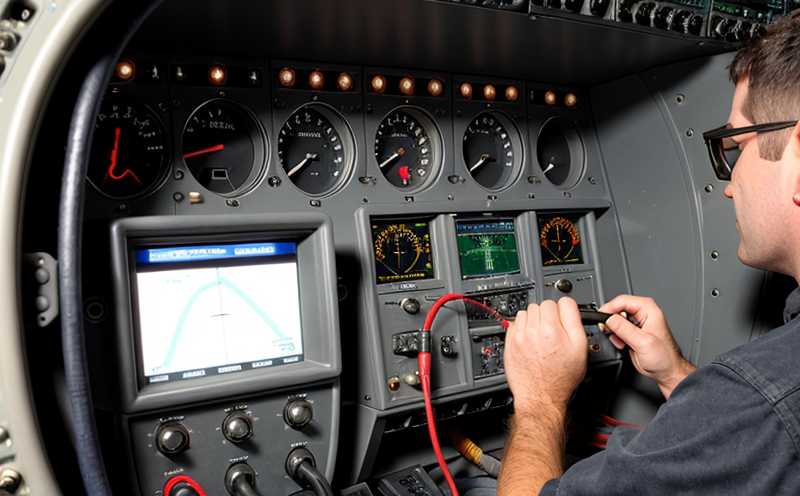ISO 1544 Avionics Connector Electrical Testing
The ISO 1544 standard is an internationally recognized specification for the electrical testing of avionic connectors. This service ensures that electrical components used in aerospace and aviation systems meet stringent safety, reliability, and performance criteria.
Avionic connectors are vital to the operation of aircraft, serving as critical interfaces between various electronic systems. Their integrity directly impacts flight safety, operational efficiency, and overall system reliability. The ISO 1544 standard provides a framework that ensures these connectors function correctly under all expected environmental conditions during an aircraft’s lifecycle.
Compliance with this standard is mandatory for avionics manufacturers as it guarantees the electrical performance of connectors used in critical systems such as communication, navigation, and flight control. By adhering to ISO 1544 testing protocols, aerospace companies can ensure that their products meet stringent quality requirements set by regulatory bodies like the Federal Aviation Administration (FAA), European Union Aviation Safety Agency (EASA), and others.
The testing process involves rigorous evaluation of connectors based on several key parameters including insulation resistance, contact resistance, capacitance, inductance, and dielectric strength. These tests are conducted under controlled conditions to simulate real-world operational environments that the connectors will encounter during their service life.
Through this comprehensive testing approach, we provide clients with reliable data regarding the performance of avionic connectors ensuring they comply fully with ISO 1544 standards. Our services encompass not only laboratory-based evaluations but also field trials where necessary to account for environmental factors that might affect connector performance in actual use scenarios.
Our expert team utilizes state-of-the-art equipment and methodologies aligned strictly with international standards such as ASTM, IEC, and EN specifications. This allows us to offer accurate assessments while maintaining consistency across multiple testing cycles.
| Test Parameter | Description |
|---|---|
| Insulation Resistance | Metric used to measure the ability of a material to prevent current flow. |
| Contact Resistance | The resistance offered by the contact interface between two conductors. |
| Capacitance & Inductance | Electrical properties that affect signal integrity and noise levels in circuits. |
| Dielectric Strength | The voltage at which insulation fails under an applied electric field. |
To summarize, our ISO 1544 avionics connector electrical testing service offers unparalleled assurance that connectors used in aerospace applications will perform reliably throughout their intended lifespan. By leveraging cutting-edge technology and adhering strictly to internationally recognized standards, we deliver precise results essential for maintaining the highest levels of safety and performance within the aviation industry.
Why It Matters
The importance of ISO 1544 avionics connector electrical testing cannot be overstated. In an environment where even minor malfunctions can lead to catastrophic failures, ensuring that all components meet stringent quality standards is paramount.
- Enhanced Reliability: Reliable connectors are crucial for maintaining consistent performance across various systems within an aircraft.
- Avoidance of Failures: Non-compliant connectors can result in system failures which may compromise flight safety.
- Regulatory Compliance: Meeting ISO 1544 standards is a legal requirement imposed by regulatory bodies worldwide, ensuring that products are fit for purpose and safe to use.
Aerospace manufacturers rely heavily on these tests to validate the quality of their avionics connectors before they enter into service. Non-conformance can lead to costly delays in product launches or even recalls if issues are discovered post-launch.
By incorporating ISO 1544 testing into your development process, you ensure that your products meet not only current but also future regulatory requirements, thereby safeguarding your brand reputation and customer trust.
Scope and Methodology
The scope of our ISO 1544 avionics connector electrical testing service is comprehensive, covering all aspects of the standard’s requirements. Our methodology involves a series of steps designed to evaluate connectors thoroughly according to internationally recognized specifications.
| Step | Description |
|---|---|
| Initial Inspection | Visual examination of connectors to check for visible defects or damage. |
| Preparation and Setup | Conducting preliminary tests on the connector to ensure it is ready for comprehensive evaluation. |
| Main Testing Procedures | Performing detailed electrical measurements as per ISO 1544 guidelines. |
| Final Inspection and Reporting | Evaluating results against specified tolerances and preparing a comprehensive report detailing findings. |
The detailed nature of these steps guarantees accurate and consistent results, providing you with confidence that your products meet the highest standards required by industry regulations.
Customer Impact and Satisfaction
- Improved Product Quality: By ensuring compliance with ISO 1544, customers receive high-quality avionics connectors that are reliable and safe for use.
- Enhanced Reputation: Meeting international standards enhances your company’s reputation among clients and stakeholders alike.
- Avoidance of Penalties: Non-compliance with industry standards can result in hefty fines; our testing service helps you avoid such penalties.
- Cost Savings: Early identification of potential issues through rigorous testing reduces the risk of costly rework or product recalls later on.
In addition to these tangible benefits, customer satisfaction is paramount. We strive to exceed expectations by delivering accurate test results within agreed timelines and providing detailed feedback reports that are easy to understand and act upon.





